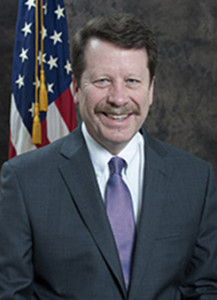After much hullabaloo, the FDA commissioner has revealed a rough draft of a plan to reorganize the food side of the Food and Drug Administration.
At the center of the plan is the creation — or recreation — of a deputy commissioner of foods post that was eliminated by Commissioner Robert Califf’s predecessor Scott Gottlieb. However, based on Califf’s announcement today, his plan to create a Deputy Commissioner for Human Foods does not provide the clear chain of command that everyone from Congress to consumer groups including STOP Foodborne Illness has been calling for.
“It’s a step in the right direction,” Mike Taylor told Food Safety News. Taylor was the most recent person to be in a deputy commissioner for foods post at the FDA, serving in the position from 2010 until mid-2016 when he retired. He is now co-chair of the non-profit STOP Foodborne Illness.

“The question is what authority the deputy commissioner will have. We need a direct line management approach. Without a direct line approach, the program remains fragmented.”
Taylor gave a nod to the fact that Califf inherited a hot mess when he took the helm of the FDA in 2022. He said progress in the area of food safety at the FDA that was made under Commissioner Margaret Hamburg from 2009 to 2015 was undermined by Gottlieb during his time as FDA commissioner.
“Gottlieb reversed the progress made by Hamburg. It created problems and was a step backward,” Taylor said.
In trying to move forward, Califf’s plan includes the creation of a Human Foods Program to be overseen by a Deputy Commissioner for Human Foods. In his announcement today he said there will be a nationwide search to find the right person, but he did not provide a timeline or any other details about the post.
Califf’s plan also includes tweaking some other areas on the food side of the Food and Drug Administration.
“I am also announcing a transformative vision for the Office of Regulatory Affairs (ORA, the FDA’s field-based operations) to support the FDA organization as a whole,” the commissioner’s statement said.
Califf also described a rough outline for other aspects of his plan.
“Under this plan, the functions of the Center for Food Safety and Applied Nutrition (CFSAN), Office of Food Policy and Response (OFPR), as well as certain functions of ORA will be unified into (the) newly envisioned organization called the Human Foods Program,” Califf said in the announcement.
“. . . The Deputy Commissioner will have decision-making authority over policy, strategy, and regulatory program activities within the Human Foods Program, as well as resource allocation and risk-prioritization.”
It is, however, still unclear how the various food entities of the FDA will be linked in terms of a chain of command. The watchdog group Consumer Reports has been following the issues at the FDA closely and its director of food policy wants to know more about Califf’s plan and is waiting to see whether it will have any impact.

“While the intentions are good and there are positive elements to the plan, it was disappointing because this vision fails to fully unify the Foods Program and give the deputy commissioner the broad authority and accountability to integrate and coordinate all the human and animal foods resources and activities,” Consumer Reports’ Brian Ronholm told Food Safety News.
As Consumer Reports director of food policy, Ronholm, like former deputy commissioner Taylor, wants to see clear lines drawn.
“Given the lack of direct line authority over key ORA components under the plan, it essentially would cement the current structural dysfunction that led to the infant formula crisis,” Ronholm said.
The infant formula crisis referenced by Ronholm brought into the public spotlight what some observers had been watching since Gottlieb’s structural changes in the FDA’s setup. The crisis this past year that saw empty shelves and parents driving for hours to find food for their babies resulted in a congressional hearing that had House committee members grilling Califf like a burger at a tailgate party.
During the hearing, details about the chain of command at the FDA came to light and consequently Califf sought a review by the quasi-governmental entity known as the Reagan-Udall Foundation. According to the organization’s website, “The Reagan-Udall Foundation for the Food and Drug Administration is an independent 501(c)(3) organization created by Congress to advance the mission of the FDA to modernize medical, veterinary, food, food ingredient, and cosmetic product development, accelerate innovation, and enhance product safety.”
Califf announced his intention for the foundation to do a review of the food side of the FDA in late spring 2022. He said the foundation would have 60 days from the beginning of its work to submit its final report. It took several months for the foundation to begin the project. It submitted its report in December 2022.
The report agreed with onlookers such as Consumer Reports, Consumer Brands, STOP, and members of Congress on many points. The most damning assessment was the conclusion that the food side of the FDA was indeed fragmented and lacking in a clear chain of command which lead to inefficiencies at best and complications of food safety work at worst.
Shortly after the Reagan-Udall Foundation’s report came out, Califf promised to release a plan by late January this year to address the issues raised. He met that deadline with hours to spare. He also promised to have additional details by the end of February, to which he committed again today.

“I look forward to providing additional public updates by the end of February on our progress, organizational design and timeline,” Califf said in his written announcement.
In addition to discussing the fragmented and inefficient organization at FDA, Califf said the Reagen-Udall report “noted several areas of need, including modernizing data systems, providing more resources and authorities, improving emergency response systems, and building a more robust regulatory program.”
The Reagan-Udall review was ongoing concurrently with an internal FDA review of the agency’s infant formula supply chain response completed in 2022. Califf said his plan addresses concerns identified in both reports.
“I believe this proposed approach addresses the recommendations outlined in both reports and takes into consideration feedback from stakeholders, as well as the voices of employees working in the Human Foods Program who had an opportunity to share input through numerous interactive and listening sessions over the past month,” according to Califf’s announcement.
In addition to the creation of a deputy commissioner, other key elements of the proposed new Human Foods Program organization include:
- Creation of a Center for Excellence in Nutrition that prioritizes the agency’s ongoing efforts to help American consumers make more informed food choices. The FDA proposes to establish an Office of Critical Foods, as directed by the 2023 Consolidated Appropriations Act, within this center.
- Establishment of an Office of Integrated Food Safety System Partnerships that will focus on coordinating and integrating food safety and response activities with state and local regulatory partners. Califf said he knows the FDA cannot be everywhere, at all times, and that relationships with state and local regulatory partners will be more important than ever going forward.
- To help support the agency’s scientifically grounded decision-making activities, a Human Foods Advisory Committee will be established. The committee will consist of external experts to advise on challenging and emerging issues in food safety, nutrition, and innovative food technologies.
- There will be an emphasis on strengthening enterprise information technology and analytical capabilities to fulfill the promise described in the FDA’s New Era of Food Safety program and support the improvement in the workflow that will accompany these changes. As part of this proposed new vision, ORA’s operating structure will be transformed into an enterprise-wide organization that supports the Human Foods Program and all other FDA regulatory programs (e.g., agency centers) by focusing on its critical activities. This realignment will allow ORA to be singularly focused on excellence in its core mission – inspections, laboratory testing, import, and investigative operations.
“As a next step, the FDA will need to develop the vision announced today into a concrete reorganizational proposal in close coordination and communication with internal and external stakeholders while ensuring we meet our labor obligations,” Callif concluded. “While details of this proposal continue to be developed, CFSAN, ORA, and OFPR will continue to operate under their current structures, with my direct oversight.”
(To sign up for a free subscription to Food Safety News, click here.)

